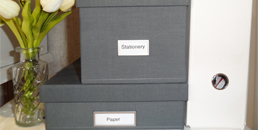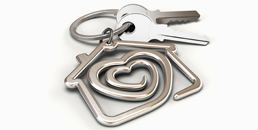by Natalie Morey | Nov 26, 2012 | Declutter tips, Home Office, Home Organisation, Office Organising, Tips
Christmas Organising
Now is the perfect time to get organised and make sure you write and mail your Christmas cards this year. Getting your Christmas cards out on time, only takes a little bit of forward planning, so what are you waiting for.
Tips To Get You Organised
Here are some of our key tips on making sure your Christmas cards get mailed this year.
- Type up your Christmas card list and keep it in a safe place so that you can refer to it (to add or delete names) year after year. I also put an asterisk next to any overseas addresses, as a reminder to post their card early.
- I find the easiest way to manage my Christmas Card list is in Excel. That way I can mail merge and print off addresses directly onto labels. You can also print directly onto the envelope, which saves you not only time but also the cost of the label.
- Create your own “return to sender labels” using labels purchased from Office Works. I have used http://www.coastallabels.com.au before and they were very quick and well priced. Also check out: https://www.thatsmine.com.au
- Set a date and plan to write your Christmas cards in the last week of November, because otherwise Christmas day will be here before you know it and that pile of blank Christmas cards will still be sitting on your desk.
- Christmas cards with ‘card only’ marked on the envelope can be posted at a reduced rate during November and December.
- Overseas mail at Christmas time takes longer to arrive. Plan ahead and arrange to send cards or presents in early to mid November, to avoid disappointments (and the very long queues at the post office).
- For great savings, buy Christmas cards, wrapping paper, ribbons and decorations at post-Christmas sales – you would be amazed how much you can save.
Until next time, happy organising.
Natalie Morey, Professional Organiser.
by Natalie Morey | Sep 30, 2012 | Declutter tips, Home Office, Home Organisation, Tips
Find a Place for Every Item – It helps keep you organised
How often do you come inside and just dump your bag and “stuff” on the bench or dining room table. The mail, handbag, the kids’ stuff. It all just goes on the bench. Before long, it becomes known as the “official dumping ground”, full of clutter and stuff. It then becomes habit for everyone else to put their stuff their too. You need to have a place for every item and you need to get into the habit of putting the items in their correct place straight away. Don’t double handle items.
Get Some Home Organisation “Containers”
Buy some small clear plastic containers (with lids), and use them to create kits where you can store all the items you need for a particular task. For instance, you could create a shoeshine kit, a bill-paying kit (think In-tray) and a container for all your batteries and so on. That way, you can easily find the things you need to accomplish your everyday tasks. By keeping things grouped together and organised it will save you time as you won’t need to spend time searching for missing items.
Dump Duplicates – and rid yourself of clutter
Why have two nonstick spatulas when one is enough? Why have three hairbrushes or 3 colanders. Throwing out duplicates is one of the easiest ways to stop clutter. A good rule to apply is “one in, one out”. When you get something new, it’s the perfect opportunity to get rid of something old. Before you bring home that big new flat-screen TV, figure out what you’re going to do with the current TV you already have. Having done this recently, I was surprised at just how hard it was to donate my old TV. It worked perfectly and I really didn’t want to put it into land fill. Often finding an organisation that can benefit from your items is good for two reasons. Firstly, you know it’s going to a good home and secondly it’s not going into land fill so it’s easier to get rid of things knowing this. So if you want to be organised you need to clear the clutter first.
Lost Keys
Are you always wasting time looking for your keys. I have done this for lots of clients and they love it. Put a hook right inside your front door. Every time you come home you hang your keys on the hook. It might take you a bit to remember to put the keys there every time you come in, but in no time it will become habit and best of all, you will always know where your keys are. You can also get some lovely hooks, so it does not have to become an eye sore.
Write a “to- do- list”
In a recent blog article, I wrote about the benefits of writing a to-do list.
They help us stay organized, get the most out of our day and ensure we complete everything that needs to be done. Here are the key tips that I mentioned:
- Write a “to–do” list the night before.
- Once on paper, you can plan, prioritise and get a system in place for managing your day.
- Make it achievable.
- Stick to your list.
- Tick off tasks when they are completed.
- Don’t procrastinate and allow yourself to get side tracked.
- Be time specific when you are writing your list and make sure you have a time frame as to when your tasks must be completed by.
- Get into the habit of writing a list every day. Once you are in the habit, you are half way there.
Until next time, happy organising.
Natalie Morey, Professional Organiser.
by Natalie Morey | Sep 27, 2012 | Declutter tips, Home Office, Home Organisation, Tips
My life working as a Professional Organiser
I love working as a professional organiser because I have such a sense of achievement when I look around and see the space or area that I have decluttered and seeing that it’s organised and sorted. Perhaps it’s a room that was once cluttered and full of junk and you couldn’t see the floor and now it’s the guest’s bedroom. I get such pleasure working with clients and helping them with areas of their life that they are struggling with, whether that be there home, home office, garage or office. So that’s why I love working as a professional organiser.
However, working as a professional organising its not just about coming in and creating a perfectly organised bookshelves or cupboard. Some clients don’t want that. Some of our home organising assistance may simply involve clearing the clutter in the hallways and on the floors, so you can get through. Perhaps it involves making the space more functional or creating more room. Its also not about coming in and making clients throw out their precious items. Each client is different, as is each space and we customise our services to meet the exact needs of the client.

A Professional Organiser will help you order, sort, cull and organise your space, whatever the area.
Working as a Professional Organiser allows me to problem solve
Working as a professional organiser allows me to teach new ideas to people. It also helps me to develop my “problem-solving” skills, because every space and every home is different and you need to constantly create solutions for different spaces. Not only do I help organise people’s lives and living spaces, but I get to use lots of different storage product. I love anything organising related, especially organising product. And, as part of my job, working as a professional organiser I need to “road test” different storage products. (Well, that’s how I justify it anyway).
As a professional organiser, you are not emotionally connected to the items, so it makes it easier to be objective when helping clients to try and decide what to keep and what to get rid of.
Working as a Professional Organiser allows me to create more time and space
Time and space are precious commodities. You can’t make more of them, but you can manage them better. That is what I like doing most when I work with clients. We create more time, through better systems and processes and create more space by decluttering, culling and using the space in a different way.
Be consistent. You need to dedicate time each day to tackle the problem, declutter and get organised. Set a goal, it might only be 10 minutes a day, but set time aside every day and start decluttering, sorting and culling. Whilst I am a professional organiser based in Melbourne we also provide professional organising assistance in Sydney, Brisbane and Perth. So if you need any help, please don’t hesitate to contact me.
Until next time, happy organising.
Natalie Morey, Professional Organiser
by Natalie Morey | Sep 25, 2012 | Declutter tips, Home Office, Home Organisation, Office Organising, Tips |
How to organise and manage your home office computer
Just like work computers, home computers also need to be looked after and maintained. Ideally, you should have one person responsible for their maintenance. This becomes especially important when several family members use the same home office computer.
Backup data and photos
Backing up your data, photos and treasured memories on your home computer is just as important as backing up your work files. So often, when I’m in clients homes and I ask them when was the last time they backed up their computer, I am horrified. The answer is often “never”. There are some cost effective portable backup devices that you can purchase from Office Works and install on your computer.
Ideally, you should store your back up drive in a different location from where your computer is stored.
It doesn’t take long to do a back up. Put it on and go and watch TV or have a coffee (or continue working).
If you have kids or other family members accessing the same computer, it might be worth setting up separate log on’s for each person. That way your files are protected and cannot be accidentally deleted off when one of the kids is playing on the computer.
Internet security and virus protection
Internet security and virus protection is just as important on home computers as it is on business computers. Make sure it is current and working correctly. There are some cost effective virus protection programs on the market such as AVG, Norton. We use Trend PC Cillon which I find to be really reliable. If you need some assistance, then organise for your IT technician to purchase and install one for you. At The Lifestylers Group, we work with a range of computer technicians that do this sort of thing, so if you need some assistance, then we are only a call away.
Don’t learn the hard way. It is essential that your virus protection is working.
If you have wireless Internet connection at home (or in the office) it is vital that the network is locked down so no one else can access it. If it is unlocked people in the surrounding neighborhood can log onto your internet connection and use your internet. Unsecure networks makes it easy for people to hack into network and access data such as bank account log in details.
Suspect emails
It’s also really important to have a policy for how you handle suspect emails. This becomes particularly important when there are different family members using the same computer and receiving emails. If you see a suspect email “doing the rounds” let the other uses know not to open it, and delete it straight off the computer.
Always be wary of files that have the following wording EXC after the file name. These files are called executable files and often contain virus. Organising your home security is such an important part of owning a computer.
So do you need to check your internet security and virus protection after reading this article?
Until next time, happy organising.
Natalie Morey, Professional Organiser
by Natalie Morey | Sep 6, 2012 | Declutter tips, Home Office, Home Organisation, Tips |
How to Get Your Mail Organised
Here are a few quick tips to help you start managing your mail clutter.
- Don’t sit the mail on the bench and say “I will come back and sort it out later”.
- When bringing the mail in from the mail box, open it straight away (standing over the bin), throwing out the envelopes and any junk mail/magazines.
- Ask yourself, “will I really read this catalogue or newspaper”?
- Once you have a pile of relevant mail, you then need to decide what action to take. Many people keep catalogues, saying that they will read it later, but they never do.
- Set a timeframe in which you must read the item and then throw it out. Take the mail out of the kitchen and into your “office” space.
- If your kitchen bench is going to be clutter free, it is really important to get into a good habit about managing your mail.
Until next time, Happy Organising
By Natalie Morey, Professional Organiser




